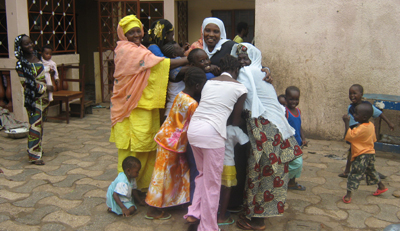On an ordinary Friday, Sarata Jabbi-Dibba, a reporter in the West African nation of Gambia, publishes her weekly column on women’s issues, “She She She,” in the only independent daily newspaper here, The Point. Last Friday however, Dibba was herself a newsmaker—after recovering her freedom.
In fact, until last Thursday evening, Dibba, who is also the first vice president of the press union in this sliver of land off Africa’s western coast, was sharing a large cell with more than 10 common criminals in Gambia’s notorious Mile 2 prison—named for its distance to the sleepy, seaside capital of Banjul. Her crime? Co-signing a press statement from the union reacting to televised remarks of President Yahya Jammeh’s about the unsolved 2004 murder of her newspaper’s editor, Deyda Hydara. For this, a judge sentenced her and five other journalists and executives of the union to two years in jail for sedition and criminal defamation. The journalists appealed and CPJ and other organizations spoke out to call for their release. Jammeh finally issued a pardon last week, setting the journalists free.
Gambia’s National Intelligence Agency arrested Dibba on June 15, the day The Point published the union’s statement. Other senior press union members and editors responsible for re-publishing the union’s statement were also picked up and interrogated.
The arrests underscored the limits of freedom of expression—a right guaranteed by the Gambian Constitution, yet continually violated by government repression. Incidentally, this was all taking place in a city that is home to the African Commission on Human and Peoples’ Rights.
For Dibba, a mother of two, including a 10-month old son, going to prison presented special challenges. She spent her first three days in prison with her son, who requires breast feeding, she said. On the third day, however, prison officials took him away. She called her lawyer and together they went to see the prison director. On the sixth day, prison officials authorized family members to bring the baby to her every day for breast-feeding.
Dibba’s five other co-defendants were held a few miles away, in a facility called Old Jeshwang Juvenile Prison, according to local journalists. That’s where Emil Touray, the union’s secretary-general and an assistant editor with the private triweekly Foroyaa spent the last two weeks after being transferred from Mile 2 Prison in mid-August. Touray told CPJ he shared a large cell with inmates convicted of petty larceny, but described relatively good treatment from guards and fellow prisoners. He had access to a television but was denied books and newspapers, he said.
Both Touray and Dibba and their co-defendants thanked Jammeh for issuing a pardon. “The Gambian Press Union has nothing against the president or the Gambian government. Instead, we are partners in development,” Dibba said, characterizing the imprisonment as “a misunderstanding” between government and the union. “We really have the interest of this country at heart,” she added.
For now, Dibba said was eager to resume her columns, which address women’s empowerment and forced marriages, among other issues. She started the column with the support and encouragement of the late Hydara. “He encouraged me to go into journalism. He was my mentor. I asked him for a column on women’s issues and he gave it to me,” she said.
Hydara’s killers are on the run now, but the editor’s legacy lives on.
